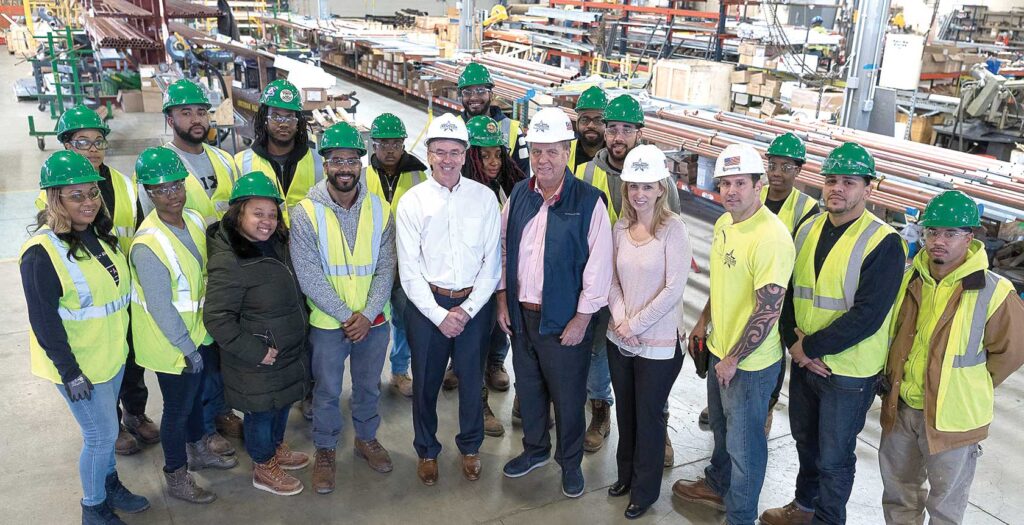
Local union leaders are celebrating $9.5 billion in federal infrastructure funding to Massachusetts that they say will lead to a growth of union jobs and apprenticeships.
They hope that those jobs will help provide new employment opportunities, especially for communities of color and women, who have been underrepresented nationally in union apprenticeships.
“$9.5 billion is coming to Massachusetts for a variety of infrastructure projects — and, of course, on the union side, that translates into good union wages and benefits but also opportunities for apprenticeships, to get people into the trades,” said Frank Callahan, president of the Massachusetts Building Trades Council.
Tanisha Sullivan, president of NAACP Boston, said that funding will allow for more diversity in union employment.
“As more financial resources come into the Greater Boston area that create more union jobs, we’re going to have a greater opportunities for more women and more people of color to be able to have those good paying jobs and also be able to work on some pretty significant projects here in the Greater Boston area,” Sullivan said.
Shamaiah Turner, a business development representative for the Northeast Regional Council of SMART, said Building Pathways — a union apprenticeship program aimed at women and communities of color in Boston — enabled her to find a job that followed her passions and to support herself.
“Having good union jobs and benefits and family-sustaining wages helps not only bridge the racial wealth gap — especially when you’re hiring equitably — but it helps people to be able to contribute to their communities in more ways than just paying taxes,” Turner said.
Callahan said the Massachusetts Building Trades Council’s point of view is that union construction jobs should be more widely open to all.
“Traditionally, you got into a trade because your father or your uncle was in that trade, not your mother or your aunt, in terms of gender,” Callahan said. “It was very male-dominated and predominantly white. And we think those opportunities should exist to all people who are interested in careers in the construction industry.”
In the Greater Boston area, work by specific unions to increase diversity, as well as programs like Building Pathways, have brought greater diversity to union apprenticeships and jobs. Callahan said his organization has actively sought out individuals from populations that have not traditionally had access to union work to join apprenticeship programs.
“It’s a real team effort to make sure that those opportunities are open to everybody,” he said.
Sullivan said it’s important that diversity extends to union leadership as well.
“We don’t just want to see diversity in apprenticeships. We don’t just want to see diversity at the entry ranks here. We also want to see increased diversity of women and people of color in leadership roles in our unions and in our locals,” she said.
Sullivan highlighted some positive examples in the Greater Boston area — Darlene Lombos, who serves as executive secretary-treasurer of the Greater Boston Labor Council, and Darrin Howell, who serves as political director for 1199 SEIU — but said there’s still room for growth overall.
Nationwide, however, union diversity is lacking, even as Callahan and Sullivan said programs in Massachusetts are leading the way in increasing equity in union apprenticeships.
Data from the Joint Center for Political and Economic Studies found that, in 2021, almost 60% of apprentices in registered union programs were white. Black apprentices made up about 9%. Additionally, Black apprentices had, on average, the lowest earnings.
As the infrastructure funding brings in new union jobs, Turner said, growing equity could help more Bostonians sustainably support themselves.
“This gives us a way to have our needs met in a different way, to not have to live paycheck to paycheck,” Turner said. “You can have a chance at saving something. I own a house in Hyde Park, which would not have been possible without this job.”
Sullivan said Boston is setting a good standard in that respect.
“What we’re excited about,” she said, “is that here in the Greater Boston area, as we are protecting and growing the middle class, we’re doing so with intentionality to ensure that people from all backgrounds have access to these good-paying jobs that provide life-sustaining wages and also help people prepare to retire with dignity.”






